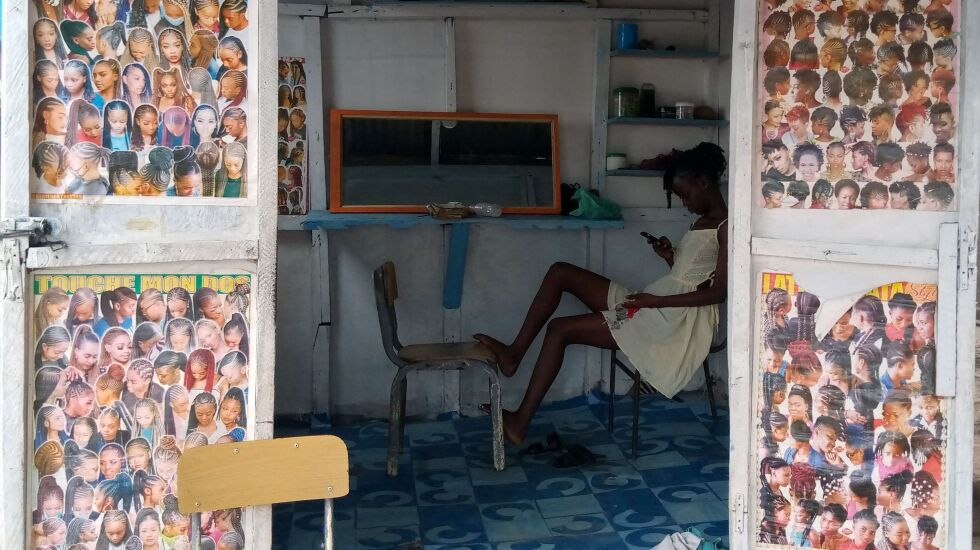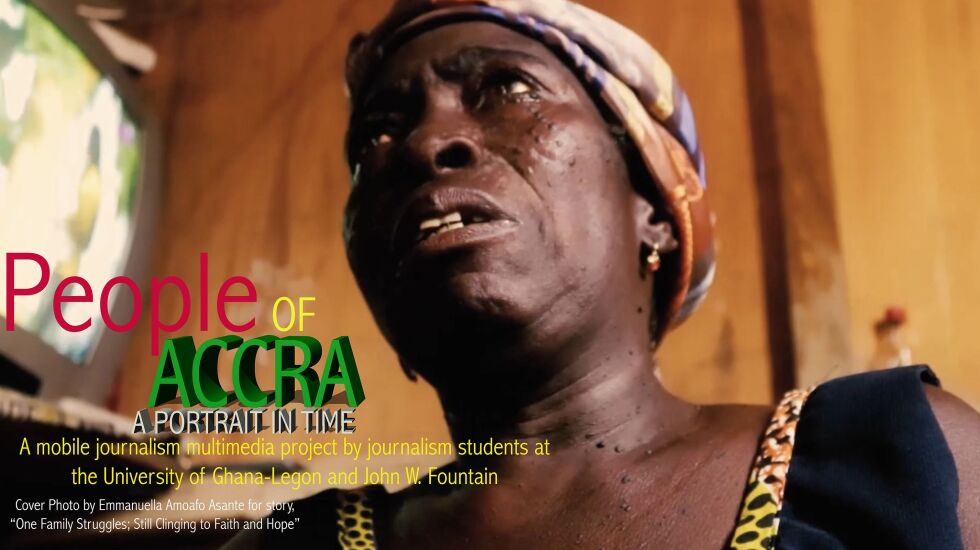
ACCRA, Ghana — Capital city. Population 2.6 million. Forty journalism students with one goal: To tell the stories of everyday people.
From bustling boisterous markets. To the relentless entrepreneurial merchants who hawk their wares in perilous streets that buzz with motorists and merciless motorbikes that dart recklessly in between traffic. To the faithful “Kayaye” — the young women who work as porters, carrying more than their weight on their heads and a small child tied in a cloth on their backs.
The consensus in Accra is whatever superlatives may be used to describe Ghana, one must also interject the word “hard.”
“People of Accra,” an online multimedia journalism project I led recently at the University of Ghana-Legon, is their story.
A story of the rhythms of life in this time. The story of a people whose hardship alone does enough to dissuade them from viewing life through the prism of possibility, even when sweat is dripping like rain from their brow, their backs aching from carrying their burdens in the heat of the day, their fingers stretched, their feet wearied and worn, and another day’s journey of toil for little pay awaiting at the light of each new sunrise.

It is a story of life, love, laughter, faith and of endurance in this capital West African metropolis where another undeniable truth glares like the suffocating traffic on the Spintex Road: “Freedom and justice,” for many here in the humbling, hardscrabble streets of Accra, looks and feels a lot like “freedom and just us.” And it is apparent, they say, that no help is coming, at least no time soon.
“Ghana is hard,” they say.
But the people of Accra are harder — more resilient than the poverty and lack that so many face. Unbreakable in spirit and in determination.
This much is also clear in their stories. Like the story of the young men who wander in search of scrap metal, lingering between homelessness and subsistence. The story of the mother who sells tomatoes in the market and ekes out a living for her family.
The story of the young woman who has broken the unspoken barrier of becoming a lottery agent in a male-dominated world. The tale of the family for whom producing and selling kenkey is their pride and joy, like a daughter called Grace who leads the family charge.
Project Genesis
Earlier this year, as a Fulbright Scholar in Ghana, I encouraged journalism students to “find the story in the ordinary.” To pursue it, unearth it and to stick to the facts. As a journalist and also as a professor, I encourage young journalists to endeavor to be a voice for the voiceless. To shine the light on corners unseen, thereby raising public awareness.
To afflict the comfortable and comfort the afflicted. To seek to make a difference through the power of journalistic storytelling that is factual, meaningful and even inspirational.
That’s the joy. The main thing that lies at the core of journalism’s heart and soul: It is covering the story of the Unforgotten — 51 mostly African American women murdered in Chicago and whose deaths may be the work of a serial killer — a story largely forgotten by the mainstream press.
The story of 10-year-old Rodney McAllister, a Black boy mauled to death by dogs in St. Louis. The stories of countless people worldwide whose lives and deaths might not rise to some mainstream editor’s sense of “newsworthiness.” Who might remain nameless and faceless — story-less — were it not for journalists with the sensitivity, purpose and commitment to seek to tell those stories.
Still critical today to life, freedom, justice and equality are the stories of everyday people like the people of Accra whose stories of daily life in West Africa deserve to be told, must be told, beyond the prism of stereotype and prevailing ignorance, and from the inside out rather than from the outside in.
That’s exactly what my journalism students at the University of Ghana did.
At semester’s end, I assembled their collective in an online multimedia project that is an abridged version of their stories.
“People of Accra: A Portrait in Time” is a story in which it becomes apparent that perhaps some of the people in this world richest in faith and spirit are those poorest in substance. That socioeconomic circumstances cannot extinguish the joy, dignity and pride of a people. And that examining the world through the prism of everyday people, even the poor, is a worthwhile undertaking for both journalism’s sake and democracy’s.
#JusticeforJelaniDay
The Sun-Times welcomes letters to the editor and op-eds. Check out our guidelines.







